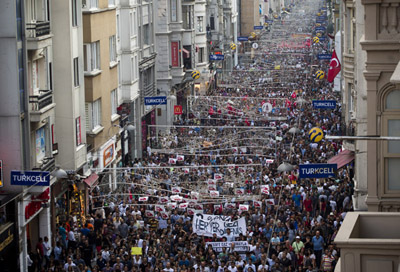

Vol. 77/No. 27 July 15, 2013
 |
| Oren Ziv/Activestills.org |
| March in Istanbul June 29 to protest killing of 18-year-old Medeni Yildirim by police who opened fire on protest against expansion of outposts in Kurdish areas. Demonstrations for Kurdish rights are being organized on heels of widespread anti-government protests. Kurdish people are pressing for language rights, release of political prisoners and other demands. |
They were protesting the death of Medeni Yildirim, an 18-year-old Kurd shot the previous day by government forces in the Lice district of Diyarbakir, the main city in the predominantly Kurdish area of southeastern Turkey. Yildirim was killed and 10 others wounded when police opened fire on a protest against a new gendarmerie outpost being built in Lice.
Demonstrations demanding an end to the government’s expansion of military outposts in the Kurdish region also took place June 29-30 in Ankara and other cities. Demands included the release of imprisoned Kurdistan Workers Party (PKK) leader Abdullah Ocalan and other political prisoners, education in the Kurdish language and removal of all barriers to its use, and an easing of requirements to enter parliament.
The Peace and Democracy Party (BDP), the main pro-Kurdish party in Turkey, has called for one month of what are being called “government, take a step” rallies, to press Prime Minister Recep Tayyip Erdogan to follow through on recognition of the Kurdish people’s national rights following the cease-fire negotiated earlier this year with the outlawed PKK. The agreement ended decades of military conflict between the PKK and Turkish government in which more than 40,000 have died.
“Someone who wants peace does not waste time building outposts,” BDP leader Sirri Sureyya Onder told the Istanbul marchers, according to the English-language Hurriyet Daily News. “Civilians expressing their outcry in a peaceful way were fired upon. All their wounds were on their back. Peace won’t come this way.”
The Kurds are an oppressed nationality of some 25 to 30 million people concentrated in southeastern Turkey, northwest Iran, northern Iraq and northeast Syria. About half live in Turkey, where they face the highest rates of illiteracy and poverty in the country. The March cease-fire agreement registered gains for the Kurdish people and a political opening for toilers in the region.
The latest demonstrations on behalf of Kurdish rights won support from many Turks who took part in the large anti-government protests that swept Turkey in June. Those demonstrations — which were sparked by a government crackdown on protests against a planned government redevelopment project in Taksim Gezi Park in Istanbul — raised demands for an end to government repression, more democratic rights, protections for national and religious minorities and women, and more rights for workers and unions. The protests were met by riot police using tear gas and water cannons, with at least four people killed, thousands wounded and hundreds arrested.
“In the big cities, the struggle of the Kurdish people and that of the Turkish people are becoming one,” said Samil Altan, a leader of the recently formed People’s Democratic Party, in a July 1 telephone interview from Istanbul. “A new wave of people came into political life with the Taksim protests. The workers and others who demonstrated on the past weekend were not only protesting against the killing of Yildirim, but to show their solidarity with the Kurdish struggle. More and more, the Turkish people see what the Kurds have been fighting against.”
Related article:
Massive anti-government actions erupt across Egypt:
Rulers from Tunisia to Turkey watch warily